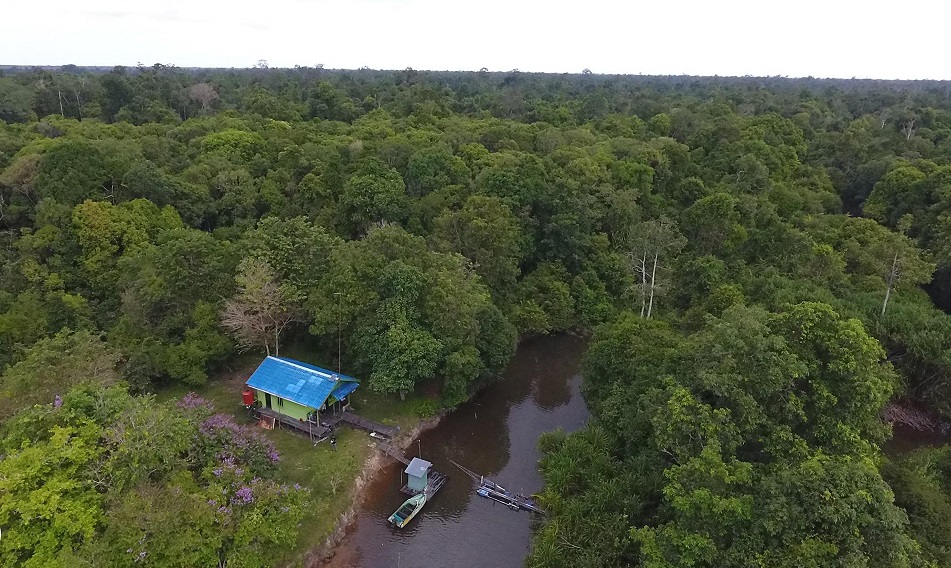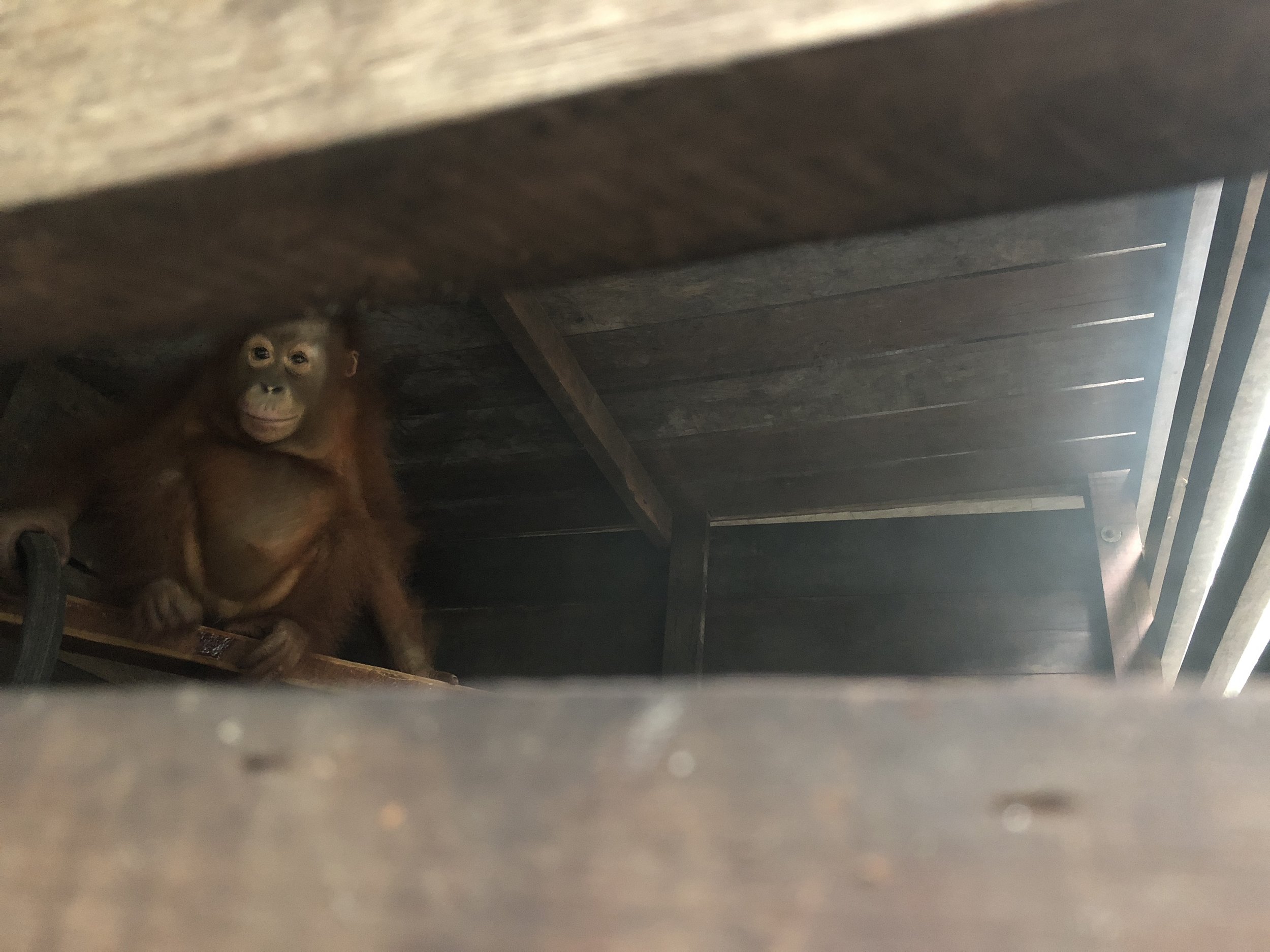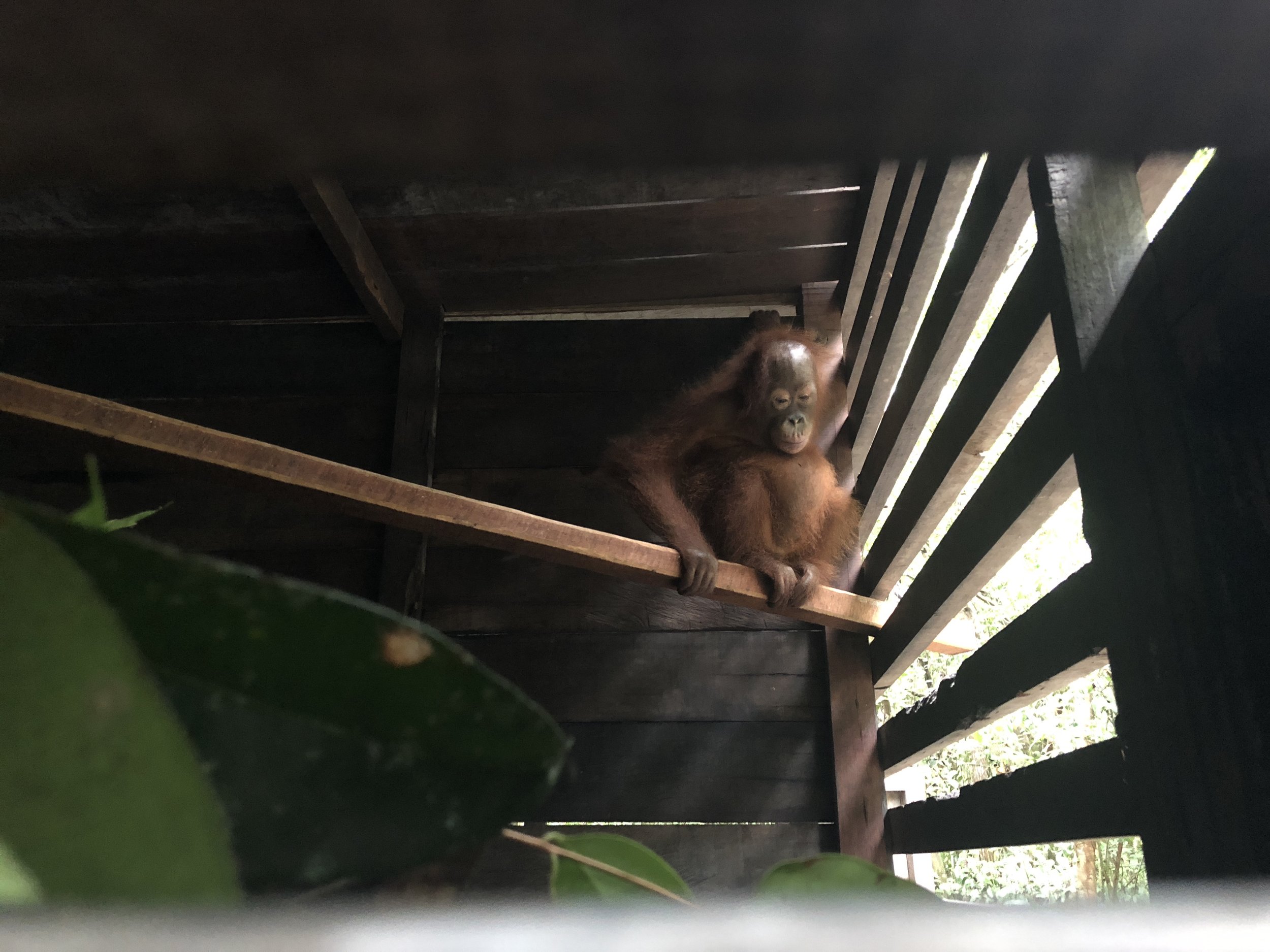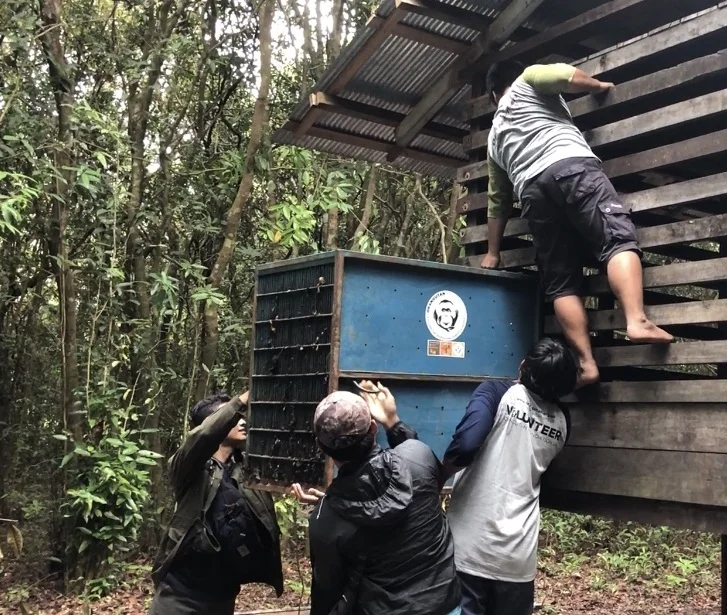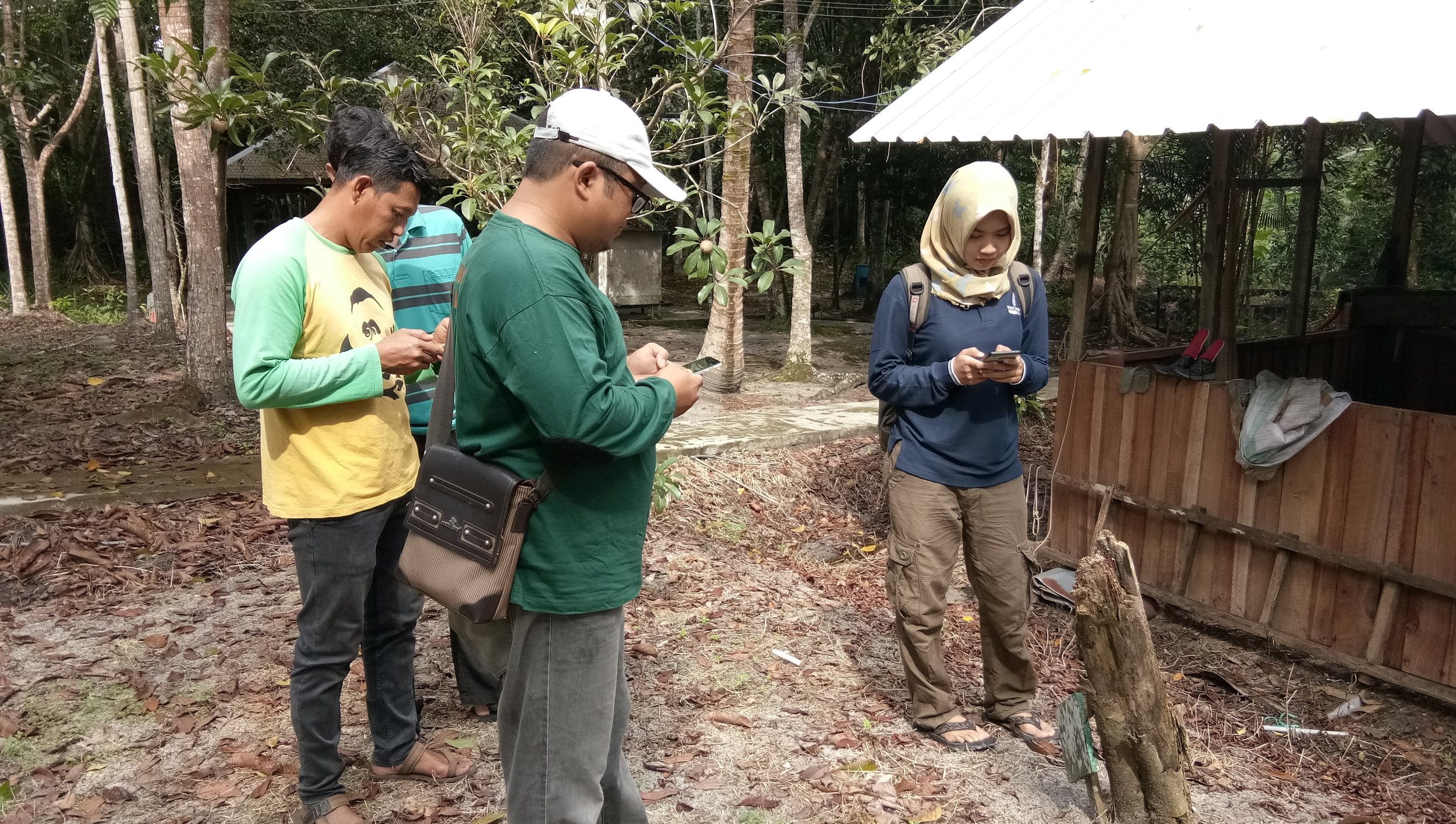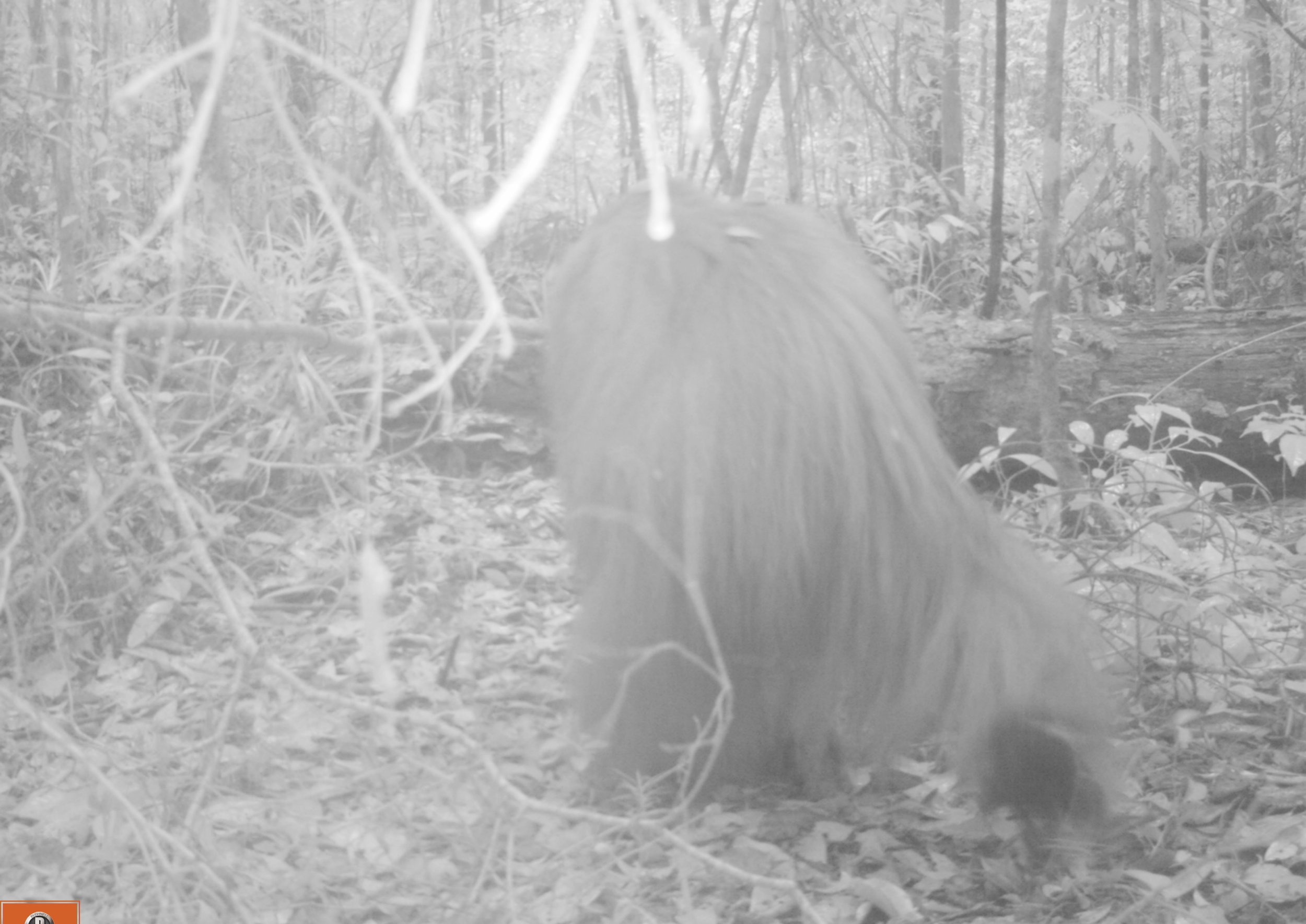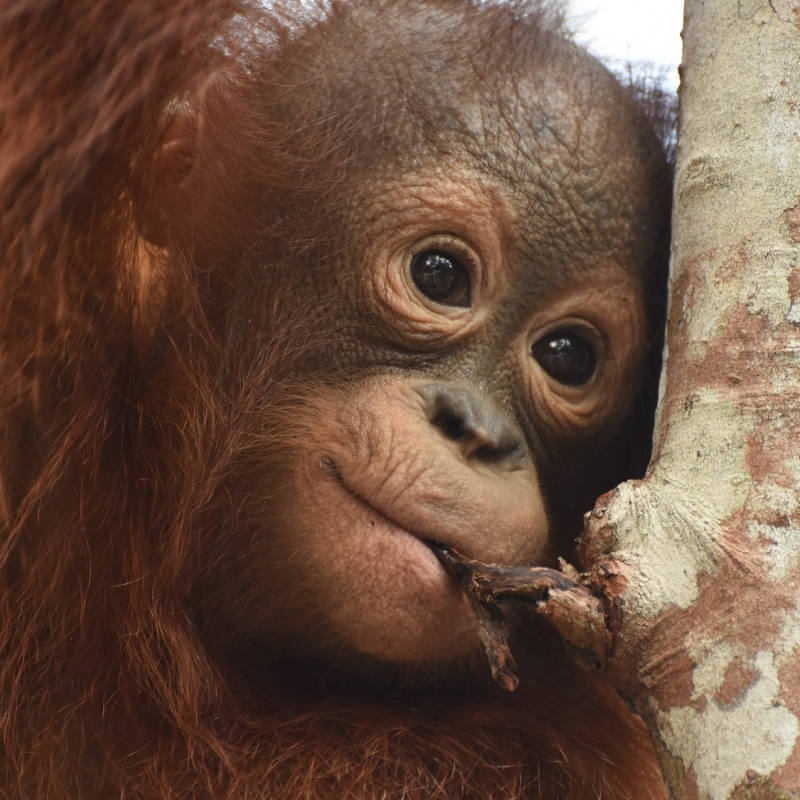Orangutans are a semi-solitary species, rarely interacting as adults. But wild orangutan Sony has been seen helping his younger brother navigate the canopies whilst their mother is not around - an extremely unusual interaction!
Orangutan Stories: A warm welcome to Gunawan!
Orangutan Stories: Finding a mate as a semi-solitary species
Orangutan Stories: Death and Birth - The Circle of Life in the Wild
2024 highlights: A look back on our conservation achievements together for orangutans, forests, and people
Orangutan Stories: The return of Andy!
Orangutan Stories: Timtom
Orangutan Stories: Ariel
Two rescued orangutans returned to the wild
Two critically endangered orangutans are now back in the wild, where they belong, thanks to the dedicated work of the Orangutan Foundation’s team and the Natural Resources Conservancy Agency of Central Kalimantan (BKSDA).
Both orangutans were wild born but tragically ended up orphaned and rescued by Orangutan Foundation. Shifa was rescued from being kept as a pet in September 2016, when she was only 2-years-old. Panglima, was rescued at the end of March 2019, from community forest, he is thought to be about 5-years-old but showed extremely wild behaviour (read more about his rescue).
Shifa rescued in September 2016
Habitat loss is forcing wild orangutans into closer contact with humans. We can’t say for sure what happened to the mothers of Shifa and Panglima but it is most likely they were killed, because they were considered as pests. As an infant, Shifa would have been clinging to her mother and so she was taken to become a pet. Panglima, being older and more independent, must have been apart from his mother when she was killed.
Panglima rescue by Orangutan Foundation and Wildlife Department (BKSDA) Central Kalimantan
Shifa was taken to the 158,000-acre protected Lamandau Wildlife Reserve, Central Kalimantan, Indonesian Borneo. She lived at Camp Buluh, one of five post-release monitoring sites in the reserve, which she shared with another orphaned orangutan, Okto. The two young orangutans were great playmates and Okto helped Shifa to adjust to her new life.
Okto (left) and Shifa (right)
Shifa always displayed very wild instincts and, as she got older, these became stronger and more evident. Increasingly she would go off exploring the surrounding forest and was reluctant to return to her enclosure at night.
Shifa in her nest and increasingly reluctant to go back into her enclosure.
It was decided to release Shifa before she released herself! When an orangutan is fully released back to an independent life, Orangutan Foundation staff follow the individual for up to two weeks to ensure the orangutan is able to survive. Ashley Leiman OBE, Orangutan Foundation Founder and Director/Trustee, was present for the two releases and was encouraged to see how readily both orangutans clambered up into the trees to begin their new life.
As soon as the transport cage door opened, Shifa shot straight out and climbed up the nearest tree
Shifa and Panglima have had to overcome massive hurdles early on in their life. Our challenge now is to ensure the rest of their life is spent in the wild. We are doing this by safeguarding their globally important forest habitat in Lamandau Wildlife Reserve. Orangutan Foundation actively monitor the reserve with a network of guard posts and regular patrolling to prevent illegal activities from destroying the forests and harming wildlife.
Why play is important for young orangutans
The orphaned orangutans in our soft-release programme in Lamandau Wildlife Reserve, Central Kalimantan, Indonesian Borneo, are taken out to play in the forest every day. Play-time is crucial for the young orangutans as it allows them to watch and learn from each other. Together, they find food and build nests. Play helps to build up their strength and climbing skills. This video, taken recently, show’s Mona “at home” in the forest. Just watch how she uses her hand-like feet and every-which-way hips to move with such ease and confidence.
The next video clip shows Nyunyu eating bark with Mona (above right) watching and joining in.
Partnerships for Protection
Most people’s idea of orangutan conservation would evoke a picture of a life in the wild, tracking these charismatic apes through the forest, rescuing and releasing them into a sunlit canopy. While this is one element, the reality of our work is a much bigger picture.
Release of orangutan back into the wild
Orangutan conservation must address the complex issues affecting the wider landscape and habitat, and this involves an in-depth understanding of land management and negotiation with government, communities, and private sector stakeholders. It sometimes feels far from the animals in the forest, but it’s fundamental to their future survival.
This week, Orangutan Foundation and the Central Kalimantan Wildlife Department (BKSDA) held a workshop on Management of Wildlife in Protected Forest and Production Forest Areas and a Forum on Orangutans and Oil-Palm Plantations. There were more than 30 participants from parties including the Directorate of Biodiversity Conservation (KKH), Ditjend KSDAE-Ministry of LHK, Central Kalimantan Orangutan Forum (Forkah), Central Kalimantan Forest Service, Orangutan Foundation (OF-UK Indonesia), Korindo Group, Wilmar Group, and Central Kalimantan BKSDA.
Workshop participants including Directorate of Biodiversity Conservation (KKH), Ditjend KSDAE-Ministry of LHK, Central Kalimantan Orangutan Forum (Forkah), Central Kalimantan Forest Service, Orangutan Foundation (OF-UK Indonesia), Korindo Group, Wilmar Group, and Central Kalimantan BKSDA.
Forum on Orangutan and Oil-Palm Plantations
The big issue for the Bornean Orangutan species is that 80% of the population are extremely vulnerable, as they live in forest habitats with no active protection (i.e. not inside a national park or wildlife reserve).
Active habitat protection: Orangutan Foundation guard post monitoring the Lamandau Wildlife Reserve, Central Kalimantan Indonesian Borneo
These forests, which have been shrinking dramatically over the last few decades, and the animals that live there, are at risk as most of them are in active ‘concessions’ – areas where access to the land has been granted for some form of industrial use. There are many different legal designations, including natural timber concessions, industrial timber plantations and areas of forest still remaining inside oil-palm concessions, as well as forests on community lands. There are also areas of ‘Hutan Lindung’, Protection Forest, a special designation where the forest provides a wider ecosystem service to protect soils and water catchment. Proper management of these forests is crucial to mitigate conflicts between humans and wildlife and to reduce the number of isolated orangutans that end up needing to be rescued.
At the end of the two days, all of the participants agreed to sign a joint commitment to implementing Best Management Practices focused on the protection of orangutans and wildlife in Production Forests and Protection Forests, as well as in oil-palm plantations. This is a vital step forward in securing the survival of the Bornean orangutan; and for this we are very grateful for the continued support from all our members and donors and in particular, to the Arcus Foundation. The next step is to ensure these commitments made on paper translate to commitments on the ground.
Wild Bornean female and infant orangutan. By Ian Wood
Rescued orangutan soon ready for release back to the wild
When Panglima was first rescued he wouldn’t use the tyre swing or browse in his enclosure - the team looking after him felt sure he would but it would take time for him to adapt to his new surroundings. They were right!
Panglima, a rescued wild Bornean orangutan is very wary of humans.
These images show Panglima using the swing and he gathers up browse (the branches and leaves he is given) and makes a nest.
Panglima using his tyre swing and browse
He eats plenty of fresh fruit and is active and healthy. He is still wary of humans and moves away when someone approaches the enclosure, but this is behaviour we want him to retain.
Panglima is a wild orangutan and though he is quite young he will be released back into the wild in June. He’ll be followed by our post-release monitoring staff. If he needs it he will have access to supplementary fruit. Watch this space for an update on his return to the wild.
Though still young Panglima is very wild and he will be better off living in the forest.
Update on rescued 5-year-old wild orangutan
Yesterday our vet, Dr Dimas, and our reintroduction manager, Mr Azhari, visited Panglima, the five-year-old wild orangutan, who we rescued last week. Panglima is temporarily being kept in isolation at Camp Siswoyo, in Lamandau Wildlife Reserve.
The staff at Camp Siswoyo provide leaves and branches every day as an enrichment. He doesn’t use the tyre swing but we’re sure he will as he adapts to his new surroundings. Panglima rests on the enclosure floor but as soon as anyone approaches he climbs to the top of the enclosure. He is wild and it is good that he is wary of humans, which is something we want to maintain. He is eating well and this is also a positive sign.
Young orangutan rescued
Yesterday, we rescued a young orangutan, aged approximately 5-years-old. Sadly, the mother was absent, we don’t know what happened to her but most likely she has died, mother orangutans would not readily abandon their offspring.
Tranquillised orangutan, named Panglima
The Wildlife Rescue Unit (WRU) team was made up of the Central Kalimantan Wildlife Department (BKSDA) and Orangutan Foundation. The Wildlife Department had received reports about an orangutan seen in a community orchard. The rescue team drove 45 minutes from the town of Pangkalan Bun to the reported location in the Pangkalan Lima area, South Arut District.
Orangutan nest high up in the tree
When the team arrived they saw two nests in one tree, but there was no sign of an orangutan. After a while the team decided to return to Pangkalan Bun. In the afternoon, the team received another report about the orangutan and so they returned. This time they saw a young orangutan very high up in the trees. The team decided to follow the orangutan until it nested in hope they could get a clear shot with the dart gun. Unfortunately they couldn’t and because it was getting dark and unsafe they decided to return very early the next morning, when hopefully the orangutan would still be in his nest.
Preparing the dart gun to tranquillise the young orangutan
Climbing up the tree to rescue the sedated wild orangutan.
The next morning, in the torrential rain, the rescue team arrived at the nest location at 4.30am. The orangutan was found above a nest, not far from where they had left him. The dart gun was prepared so that the orangutan could be tranquillised. They managed to get a clear shot and the orangutan fell into its nest. One of the rescue team climbed a 10-meter tall tree and managed to carry the orangutan down.
The Orangutan Foundation vet immediately conducted an examination and the orangutan was male, weighing approximately 15kg and was estimated at around 5-years-old. Our vet, Dr. Dimas Yufrizar, took blood samples for laboratory tests and gave injections of multivitamins and antibiotics.
The orangutan has been named Panglima (relating to the rescue location) - giving orangutans names helps the field staff with post-release monitoring and communications.
Tranquillised orangutan being examined by Orangutan Foundation vet
Panglima was transported to the Pangkalan Bun BKSDA SKW II office where he is being kept temporarily in a holding cage. Hendra Gunawan, Orangutan Foundation Program Manager said BKSDA have requested that the orangutan be translocated to the Lamandau Wildlife Reserve, a protected area. Before release, Hendra said Panglima will be isolated until his blood tests return and then habituated for three months. His condition will be monitored by the Orangutan Foundation vet and field staff.
The rescue team are confident that Panglima’s release into the reserve will be successful and that he will go on to live a wild and safe life in the Lamandau Wildlife Reserve.
Support our work and join Orangutan Foundation today.
Conservation of wild orangutans living outside protected areas
A very successful two day workshop was organised by our partners Yayorin (Indonesian NGO) and Orangutan Foundation to address the conservation issues facing 78% of wild orangutans, who live outside of protected areas. The focus was training in SMART technology to monitor and survey orangutan populations and prevent crimes against orangutans, wildlife and forests.
Certificate awarded for participating in SMART training
The workshop was well attended and all participating received practical training.
Workshop attendees included Yayorin, Orangutan Foundation, SKW II Balai KSDA Kalimantan Tengah, Tanjung Puting National Park Office, Sukamara-Lamandau Regional Forest Service Office (KPHP) , Seruyan Regional Forestry Service Office (KPHP), Nangamatu Village - Belantikan Raya and Pangkalan Bun Antakusuma University.
Thank you to Arcus Great Apes and Gibbon Program for funding this important initiative.
Orangutan Foundation vet's surprise river encounter
Orangutan Foundation’s vet, Dr Dimas Yuzrifar and our Reintroduction Manager, Pak Azhari, visit the post-release orangutan monitoring camps, in the Lamandau Wildlife Reserve , Indonesian Borneo, on a weekly basis to check up on the orangutans, who live there. Last week, they had an unexpected encounter…
Play time! Okto and Shifa at Camp Buluh January 2019
Their first stop was Camp Buluh, where orphaned orangutans Okto and Shifa were out playing in the trees. Camp Buluh staff said that they were both healthy and active and because they had been given their multi-vitamin and anti-worming injections the week before, they were left to carry on playing.
Okto having his regular boost of essential minerals and vitamins.
Second stop, Camp JL - young orphaned orangutans 5 year old Nyunyu (left) and 3.5 year old Mona (right) playing in the trees.
The next stop was Camp JL to check on Adib and see how his arm was healing and to see Mona, Nyunyu, Timtom and Boy.
Camp JL- 3.5 year-old female orangutan Timtom, January 2019.
The only access to the release camps is by river and so Dr Dimas and Pak Azhari headed off to their final camp of the day, Camp Gemini . Half way through their journey they came across a longboat with an unexpected passenger!
Female orangutan, Sheila in Camp Gemini’s longboat.
Adult female orangutan Sheila and her infant Sony, had untied and taken the longboat, belonging to Camp Gemini, and were using it to cross the river. Sheila was in no hurry to leave the boat but eventually they climbed out onto the river bank and up into a tree. Azhari and Dimas managed to tow the longboat back to Camp Gemini, where the relieved team of Camp Gemini staff were waiting. They’re devising another way to prevent these highly intelligent great apes from taking a boat again!
Caught on camera, but who did it? Orangutan, bear, deer or pig?
Camera traps are a window into the fascinating and private lives of wildlife. Maintaining and keeping the cameras working in the hot humid and damp conditions of a rainforest is an ongoing challenge. Battling the elements is something our researchers are prepared for but they were shocked to find that one of the camera traps had been severely damaged, torn apart and discarded broken, 2 meters away from its original position. Who had done this?
Damaged camera trap
What the culprit hadn’t realised was that the data before the incident was undamaged and so our researchers could look back and see who had been out and about! Their suspects were orangutan, sunbear, deer and wild pigs.
Orangutan
Sun bear
Was it a deer?
Wild pig
On closer examination there were bite marks on the camera and it had been pulled off the tree. A sun bear could pull it off but there weren’t any claw marks and these would be evident. We suspect it must have been an orangutan. They are a highly intelligent and curious species and this is why it probably wanted to inspect the unusual device it found in its forest home. This is alone is a reason we need to continue to find out about them and work to conserve them.
News from the orangutan monitoring release camps, Lamandau Wildlife Reserve
Orangutan Foundation vet, Dr Dimas, has kept a close eye on the healing of Abid’s broken arm. Two-year-old orangutan Adib fractured his arm on 16th December after he fell from a tree.
Two-year-old orangutan Adib’s arm is healing well and he now has a strong grasp.
We are delighted to report that Adib can now grasp the wood in his enclosure and he’s started to play and swing around inside. He shows no sign of pain when his hand is held, and he has a strong grip on the camp staff when they pick him up. Due to his young age his bones will heal quickly and we are sure he’ll make a full recovery and be back in the trees at Camp JL in a week or two.
Okto enjoying the high-water levels at Camp Buluh!
There is no forgetting it is the rainy season in Borneo! Okto and Shifa are certainly taking full advantage of the high-water levels at Camp Buluh.
Orangutan Shifa joining in too.
Shifa is progressing very well and the Camp staff are finding it increasingly difficult to return her in the evenings from the forest back to her enclosure. This is a very positive sign and we are hopeful that we will soon release Shifa from soft-release to an independent life into the wild. Watch this space…
With plenty of fruit in the forest, not many of the post-release orangutans come for supplementary fruit. However, Bangkal, the dominant male orangutan at post-release monitoring Camp Gemini has been seen in the forest. Read more about Bangkal’s extraordinary survival story by clicking here.
Donate to support our work in the Lamandau Wildlife Reserve, Indonesian Borneo.
Young orangutan Adib falls and breaks his arm.
Young orphaned orangutan Adib fell and broke his arm
Poor little Adib has broken his arm.
As usual, he was playing in the trees at Camp JL but, whilst swinging from one tree to another, he missed and fell to the ground.
Camp staff suspected he had broken his arm as he wouldn’t use it.
Our vet decided to x-ray Adib’s arm, which revealed a small fracture on his right ulna.
We are not worried about this impacting Adib’s future in the wild. At his young age, bones regenerate rapidly.
Adib’s arm has been fixed to ensure it heals correctly and he has been given anti-inflammatory to reduce swelling and multivitamins and calcium supplements to aid the healing process.
For the next few weeks Adib will have to stay in a smaller enclosure, which will help him to rest his arm.
Meanwhile, he’s being given some tender loving care and special treats such as banana porridge!
We are sure it will not be long before Adib is back in the trees playing once again with the other orangutans in our soft-release programme, in the Lamandau Wildlife Reserve, Indonesian Borneo.
Orangutans with a second chance of being wild
This blog post brings you news on some of the orangutans who we are caring for or who have been released back into the wild.
Orphaned orangutan Mona November 2018
This is little Mona, she's been in our care since March 2017 and she's making excellent progress. She always seems to be photographed with her something in her mouth! One day she'll be fully released back into the wild. We are trying to ensure this "wild", the 158,000-acre Lamandau Wildlife Reserve, Indonesian Borneo, stays protected.
This sweet photo of Okto and Shifa, shows Shifa when she had been recently rescued, two years ago. She initially had problems with hair loss, possibly as a result of stress but this has now regrown into a beautiful coat of hair!
This Ketty, who was released back into the wild in 2017 and above you can just about see infant orangutan Ariel, Ketty's "adopted sibling"! It is incredibly rewarding when we hear about or see again an orangutan who has been given a second chance to be free in the wild.
Ketty was born in the wild to Korin, a reintroduced orangutan to the Lamandau Wildlife Reserve. Korin sadly disappeared in 2013 and our staff found Ketty alone, only a few years old. In 2017, after 4 years of being cared for by us Ketty was released back into the wild. She was soon adopted by adult female orangutan Acuy and her infant Ariel and we often see all 3 together, Ketty playing with Ariel, while Acuy watches on.













